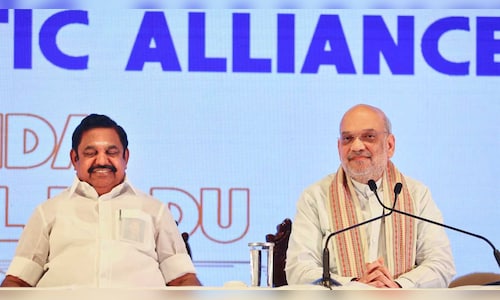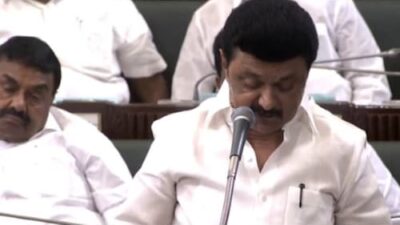Led by former Chief Minister Eddapadi K. Palaniswamy (EPS), the party has retained its position after a contentious leadership struggle with party colleague and former Chief Minister O. Paneerselvam (OPS). EPS, who collaborated with the BJP-led NDA government from 2016 to 2021, has maintained a productive relationship with BJP leadership. Union Home Minister Amit Shah’s recent announcement in Chennai included a definitive political message positioning EPS as a challenger to the current M K Stalin-led DMK government.
The upcoming summer elections present a crucial chance for EPS to demonstrate to Tamil Nadu voters that the alliance is beneficial and to reclaim the ground lost after Jayalalithaa’s passing. After parting ways with the BJP two years ago due to disagreements and opposing the Waqf (Amendment) Act this month, EPS now faces the challenge of justifying this shift. Is the change influenced by the BJP’s new state leadership under Nainar Nagenthran instead of K Annamalai? Both EPS and Annamalai share roots in the Gounder community and target a similar voter base.
A significant hurdle will be campaigning alongside the BJP, which has pledged to create a consensus-driven governance framework commonly referred to as the Common Minimum Programme. How does the AIADMK plan to approach the looming delimitation process, the emotionally charged three-language formula (often seen as an imposition of Hindi), and the NEET exemption, considering its stance aligns with that of the DMK’s opposition?
While the AIADMK may launch attacks on the DMK-led administration regarding governance and corruption, EPS will need to devise a strategy that does not disadvantage the alliance with the BJP, now a close ally.
Data from the 2021 assembly elections indicates that the DMK-led Secular Progressive Alliance, a coalition of 13 parties, garnered over 45 percent of the vote share, with the DMK itself receiving more than 37%. In contrast, the AIADMK-led NDA achieved nearly 40%, with its lead party capturing around 32%, trailing the DMK by five percentage points. However, circumstances shifted during the 2024 Lok Sabha elections.
The AIADMK severed ties with the BJP, leading both parties to contest under separate coalitions. An assertive campaign by the newly appointed Annamalai boosted the BJP’s vote share from approximately 2.60% in the 2021 assembly to over 11% in the Lok Sabha elections. The AIADMK secured about 20% of the vote, whereas the DMK received 27%. These results reflect a mixed outcome, prompting both alliances to rethink strategies for maximum electoral gain.
In response, CM Stalin has asserted that the BJP-AIADMK alliance is one driven by necessity, suggesting that the AIADMK’s actions are influenced by central agencies scrutinizing its leadership. While this commentary can be viewed as typical political rhetoric, it’s worth noting that back in 1998, Jayalalithaa had made then-BJP PM candidate Vajpayee wait for ‘letters of support,’ indicating a more complex political negotiation for key positions.
Yet, a new variable in the political landscape is the emergence of the Tamizhaga Vettri Kazhagam, a party established by young superstar Vijay, also known as ‘Thalapathy’ (Commander). Launched last year, Vijay is engaging his extensive fan base to unite them under the party banner, appealing to the youth and those frustrated with the two dominant Dravidian parties’ decades of governance.
While Vijay has not publicly declared a political alignment, he remains open to potential alliances, with speculation suggesting a possible partnership with the AIADMK. Since the introduction of TVK, the popular actor has targeted the DMK, accusing it of fostering dynastic politics.
Vijay’s entry into politics re-establishes the connection between Tamil politics and the film industry, a relationship that spans back to C.N. Annadurai, M.G. Ramachandran, Karunanidhi, and Jayalalithaa, alongside the roles of the late Vijayakanth and Kamal Hassan.
Recognizing the potential threat presented by the youth-driven movement, the DMK hastened the elevation of Stalin’s son, Udhayanidhi, to the role of Deputy Chief Minister. This strategy not only grants Udhayanidhi time to solidify his position but also allows Chief Minister Stalin to carve out a national role, especially as a mediator on the critical delimitation issue currently debated among southern and other parties. The political dynamics in Tamil Nadu are poised for significant developments.
—The author, K V Prasad, is an author and political analyst. The views expressed are personal.
Read his previous articles here



